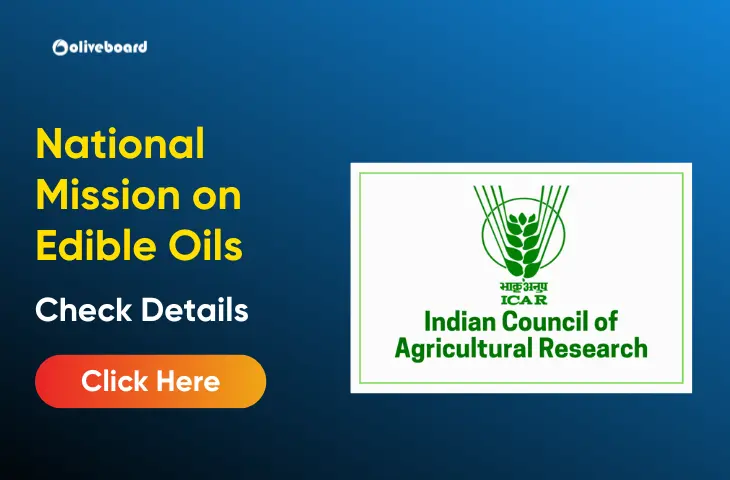National Mission on Edible Oils – Oil Palm Scheme
The National Mission on Edible Oils (NMEO) places a significant focus on the oil palm sector, aiming to enhance production, productivity, and promote improved technologies. This initiative involves various stakeholders, such as the State Department of Agriculture, State Department of Horticulture, Central University, ICAR Institutions, CDDs, SAUs, KVKs, Central Agencies/Cooperatives, Oil palm processors/ Associations, and DD Kisan.
Overview table of National Mission on Edible Oils
| Aspect | Details |
|---|---|
| Mission Name | National Mission on Edible Oils – Oil Palm Scheme |
| Launch Date | August 2021 |
| Focus | Enhancing production, productivity, and promotion of improved technologies in the oil palm sector |
| Target | Increase oil palm area to 10 lakh hectares by 2025-26 |
| Implementing Stakeholders | State Department of Agriculture, State Department of Horticulture, Central University, ICAR Institutions, and more |
| Nodal Agency | Department of Agriculture/Horticulture of State Governments |
| Financial Mechanism | Funds channeled through State Departments of Agriculture/Horticulture via State Governments; Direct Benefit Transfer (DBT) system |
| Components and Assistance | – Area Expansion – Planting Material – Maintenance – Intercropping – Drip Irrigation/Pump-set/Borewell/Water Harvesting Structure – Harvesting Tools |
| Benefits | – Enhancing production and productivity of oil palm – Promoting and extending improved technologies – Provision of quality planting material |
| Eligibility | Open to all with no restrictions on applicants |
| Apply Online | Steps: 1. Contact District/Block Agriculture Officer 2. Proposal Finalization by SLSC 3. Funds Sanction and Release 4. Allocation to Individual Beneficiaries |
| Documents Required | – ID Proof – Land Documents – Bank Details – Photographs |
National Mission on Edible Oils Launch Date
The National Mission on Edible Oils (NMEO), specifically focusing on Oil Palm (NMEO-OP), was launched in August 2021. This mission aims to enhance edible oilseed production and availability in India by expanding oil palm cultivation, increasing crude palm oil (CPO) production, and reducing the burden of edible oil imports. The target is to increase the oil palm area to 10 lakh hectares by 2025-26, with a focus on both general states and the North Eastern states.
Implementing Stakeholders
The responsibility for implementing the NMEO-Oil Palm scheme rests with key entities such as the State Department of Agriculture, State Department of Horticulture, Central University, ICAR Institutions, and more. These stakeholders play a crucial role in ensuring the successful execution of the program.
Nodal Agency and Partnerships
The Department of Agriculture/Horticulture of the State Governments acts as the nodal agency for the area expansion program of oil palm in their respective states. Close collaboration with processors is emphasized, with eligibility granted for setting up seed gardens, seed nurseries, and the distribution of planting material. Private sectors and NGOs can also participate through partnerships with State Departments of Agriculture, Horticulture & ICAR.
Financial Mechanism of National Mission on Edible Oils
Funds for the NMEO-Oil Palm scheme will be channeled through the State Departments of Agriculture/Horticulture via their respective State Governments. The Direct Benefit Transfer (DBT) system facilitates the smooth transfer of funds to various stakeholders, including farmers, processors, and State Agricultural Universities (SAUs).
Components and Assistance
The scheme provides assistance for various components crucial to the oil palm sector, including:
- Area Expansion
- Planting Material
- Maintenance
- Intercropping
- Drip Irrigation/Pump-set/Borewell/Water Harvesting Structure
- Harvesting Tools
- Custom Hiring Center
- Seed Gardens
- Seed Nursery
- Oil Palm Processing Mill
- Replanting of Oil Palm Garden
- Half Moon Terrace
- Fencing
Benefits
The NMEO-Oil Palm scheme aims to provide several benefits, including:
- Enhancing production and productivity of oil palm.
- Promoting and extending improved technologies.
- Provision of quality planting material.
- Support for nutrient management and pest management.
- Provision of various components for interventions covering farm implements/machines, capacity building of farmers, water-carrying pipes, fertigation, harvesting technology, etc.
Eligibility
The scheme is open to all, with no restrictions on who can apply.
National Mission on Edible Oils Apply Online
The application process involves the following steps:
- Step 01: Interested beneficiaries can contact the District Agriculture Officer/Block Agriculture Officer to apply for the scheme.
- Step 02: The State Level Screening Committee (SLSC) will finalize proposals received from entrepreneurs in the districts, and fund allocation to states will be based on their Annual Action Plan (AAP).
- Step 03: State governments will sanction and release funds to the district.
- Step 04: District agriculture departments will allocate funds to individual beneficiaries.
Documents Required
To apply for the scheme, interested individuals need to provide the following documents:
- ID Proof
- Land Documents
- Bank Details
- Photographs
Note: Specific document requirements may vary based on the type of intervention and the state.
Frequently Asked Questions
Ans: The NMEO Oil Palm Scheme aims to enhance production, productivity, and promote improved technologies in the oil palm sector, with a focus on expanding cultivation and reducing edible oil imports.
Ans: NMEO-OP was launched in August 2021 with the goal of increasing oil palm area to 10 lakh hectares by 2025-26, encompassing both general and North Eastern states.
Ans: Stakeholders include State Departments of Agriculture/Horticulture, Central University, ICAR Institutions, CDDs, SAUs, KVKs, Central Agencies/Cooperatives, Oil palm processors/ Associations, and DD Kisan.
Ans: Funds for the NMEO-Oil Palm scheme are channeled through State Departments of Agriculture/Horticulture via their respective State Governments, facilitated by the Direct Benefit Transfer (DBT) system.
Ans: The scheme provides assistance for various components crucial to the oil palm sector, including area expansion, planting material, maintenance, intercropping, irrigation, harvesting tools, seed gardens, processing mills, replanting, and fencing.
- IBPS AFO Bank Wise Vacancy 2025 Out, Check Complete List
- SSC JE Previous Year Question Papers, Download the Free PDF
- IBPS AFO Bank Preference List 2025, Get Participating Banks List
- IBPS AFO Documents Required for Interview 2025, Complete List
- IBPS AFO Books 2025, Check Complete List of IBPS AFO Books

